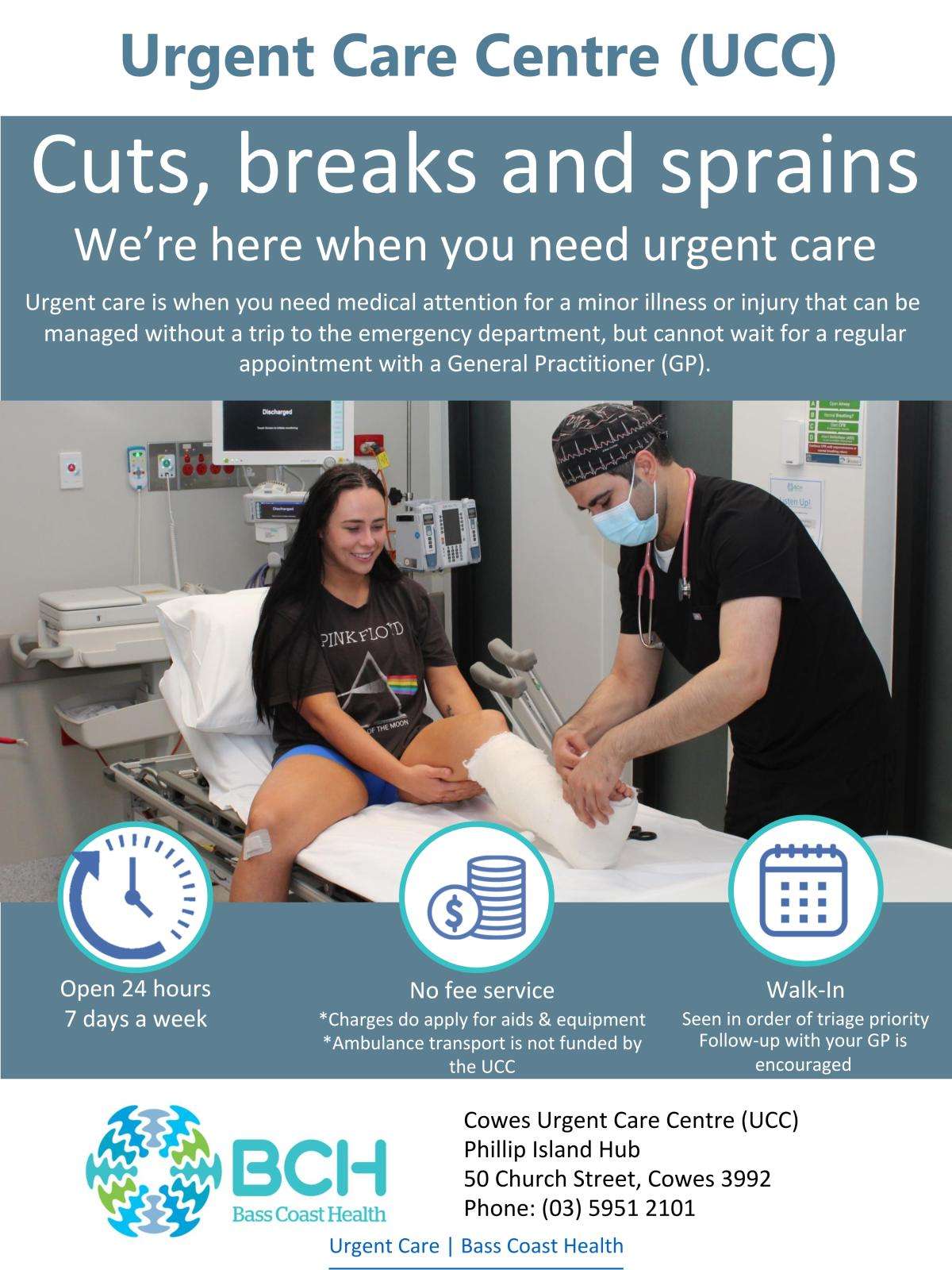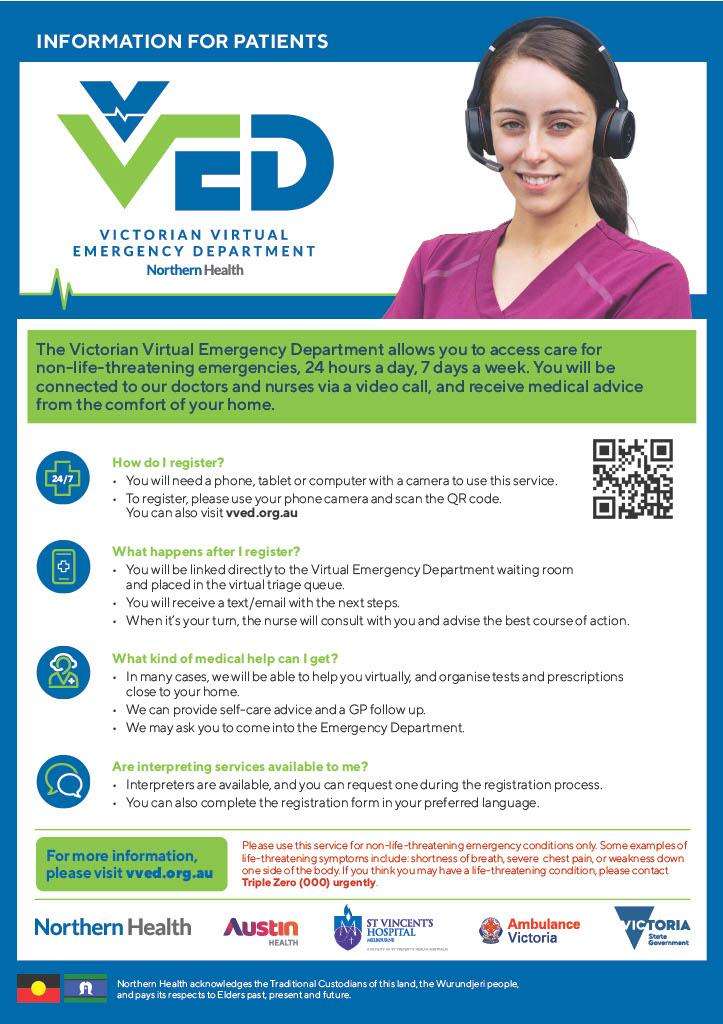Emergency Care
On this page:
What we do
The Emergency Department (ED) at Wonthaggi Hospital treat patients who are experiencing Emergency or life-threatening illnesses and injuries require immediate medical attention and management.
Our Emergency Department operates 24 hours a day, 7 days a week.
If you or someone you know has a life-threatening injury or illness, please call triple zero (000) or go to your nearest emergency department.
Your journey through the Emergency Department
Registration and Triage
When presenting to the Emergency Department or Urgent Care Centre you will be seen by a nurse who will ask for your symptoms and perform routine checks.
Based upon this initial consultation, the nurse will place you in a triage category.
Triage Categories
Category 1 - Resuscitation (the patient is unconscious or barely breathing)
Category 2 - Emergency (very severe pain, severe breathing difficulties)
Category 3 - Urgent (dehydration, moderately severe blood loss)
Category 4 - Semi-urgent (mild bleeding, sprained ankle)
Category 5 - Non-urgent (rashes, minor illnesses or symptoms).
You or your carer will then be required to give your name and date of birth to the nurse and either asked to be seated in the waiting room or admitted, depending on your category.
Waiting room
The amount of time you may wait in the Emergency Department depends on your triage category.
Please remember that more severe cases will be seen as a priority so if you have been triaged as a Category 4 or 5 severity, you may have to wait longer than the allocated time given to that category.
Weekends, and in particular holiday seasons, can also place added pressure on the Emergency Department and Urgent Care Centre, as an influx of holidaymakers in the region can result in longer waiting times.
If you need to use the toilet or step outside the waiting room, please inform the administration clerk or nurse. It is important you do not leave the Emergency Department or Urgent Care Centre without informing a staff member.
Treatment
When you are admitted to the Emergency Department or Urgent Care Centre, you will be initially seen by a senior nurse and then a doctor. At all times you should be aware of the type of treatment taking place. If you are unsure about tests, treatment or the process, please ask a member of staff.
Your test results or diagnosis may require you to be admitted into a ward at Bass Coast Health's Wonthaggi Hospital or possibly transferred to another health service. Alternatively, the doctor may believe an admission is not required and you will be discharged home after observation.
At all times staff will communicate with you throughout the process to ensure you are involved in your care planning.
Discharge
When you leave the Emergency Department or Urgent Care Centre:
Collect all your personal belongings including x-rays, medications and medical documentation
Ask for a medical certificate if you need one.
A member of your treatment team may give you a letter explaining your situation to help your doctor continue your care. Please keep it in a safe place.
You may be instructed to follow-up care with your local doctor.
Bass Coast Health will always see the most seriously sick or injured first, not in order of arrival.
The Emergency Department and Urgent Care Centre can experience busy periods, such as on weekends and holiday seasons. Our wait times may vary and difficult to predict. We appreciate your patience during these times.
Alternatives to Emergency Department care
The Emergency Department is best for serious and life-threatening conditions. Please use our emergency services carefully so we can continue to provide the best care to those that need it most. If your situation is not a medical emergency, alternative options can be considered.
Bass Coast Health has an Urgent Care Centre at the Phillip Island Health Hub at Cowes.
Urgent care is best when you need medical attention for an illness or injury that can be managed without a trip to the emergency department, but cannot wait for a regular appointment with a general practitioner (GP).
All patients are seen in order of triage priority.
We encourage you to arrange follow-up care with your General Practitioner (GP).

For further information:
When should I visit the Urgent Care Centre?
What is the difference between the Emergency Department and Urgent Care?
Urgent care is when you need medical attention for an illness or injury that can be managed without a trip to the emergency department, but cannot wait for a regular appointment with a general practitioner (GP).
The Urgent Care Centre can provide acute episodic care and treatment that does not require a hospital admission. This may include:
- minor infections
- minor fractures, sprains, sports injuries and neck and back pain
- urinary tract infections (UTIs)
- sexually transmitted infections (STIs)
- minor cuts
- insect bites and rashes
- minor eye and ear problems
- respiratory illness
- gastroenteritis
- mild burns.
For further information on when to visit an Urgent Care Centre, click here.
To find your nearest Urgent Care Centre, click here.
- Urgent care is when you need medical attention for an illness or injury that can be managed without a trip to the emergency department, but cannot wait for a regular appointment with a general practitioner (GP).
- Emergency or life-threatening illnesses and injuries require immediate medical attention and management by an emergency department or hospital.
For further information about the difference between routine, urgent and emergency care, click here.
The Victorian Virtual Emergency Department (VVED) is a public health service to treat non-life-threatening emergencies.
The VVED is a free, 24 hours a day, 7 days a week service that connects you to an emergency doctor or nurse from your computer, laptop or mobile phone, wherever you are.
Interpreter services are available for patients who prefer to speak in their own language.

To access the Victorian Virtual Emergency Department:
- Make sure you have access to a device with a camera (mobile phone, computer, laptop or tablet)
2. Access the Victorian Virtual Emergency Department website
3. Click the ’Register now’ link
4. Complete the registration form.
A link to the Victorian Virtual Emergency Department waiting room will be sent to you via SMS and email:
- Click on link to open HealthDirect
- Click 'Start Video Call' to enter the waiting room
- Enter your details and click 'Continue'
- Wait for one of the Victorian Virtual Emergency Department team to pick up your call.
For more information or if you experience any issues with the registration form, please visit www.vved.org.au, call 03 9485 9070 or email vved@nh.org.au
Nurse on Call is a Victorian phone service providing immediate, expert advice from a Registered Nurse 24 hours a day, 7 days a week. This service is best for the following situations:
- You or someone you care for is feeling unwell
- You are not sure if you should seek medical help
- You are physically a long way away from medical help
- You need advice about health services in your local area.
Phone: 1300 60 60 24.
To find a GP near you, click here.
For over the phone or online consultation (costs may apply), go to Online Telehealth Consultations & Services | Healthengine.
For after-hours support (cost may apply):
In the case of a poisoning incident, the Victorian Poisons Information Centre can advise you what first aid is required, whether it is necessary to call an ambulance, to go to the doctor or whether nothing needs to be done.
The service operates 24 hours a day, 7 days a week.
Phone: 131 126.
Do I need a referral?
You do not need a referral letter from your doctor to access this service.
Will I have to pay for services?
The Emergency Department and Urgent Care Centre at Bass Coast Health are part of Australia's publicly funded healthcare system and offers hospital care to any Australian resident under Medicare arrangements.
Please note, fees do apply to aids and equipment if provided on discharge from the Emergency Department or Urgent Care Centre.
Refer to Charges for Primary Healthcare Services and Overseas Visitors.
Ambulance transport (if required) is not funded by the Urgent Care Centre.
Transport fees are your responsibility. We encourage you to check your ambulance cover.
Where are we located?
Emergency Department, Wonthaggi Hospital, 235 Graham Street, Wonthaggi.
Urgent Care Centre, Phillip Island Health Hub, 50 Church Street, Cowes.
How to contact us
Emergency Department at Wonthaggi Hospital
Phone: (03) 5671 3333
Fax: (03) 5671 3342
Location: Emergency Department, Wonthaggi Hospital, 235 Graham Street, Wonthaggi.
Urgent Care Centre at the Phillip Island Health Hub, Cowes
Phone: (03) 5951 2101
Location: Phillip Island Health Hub, 50 Church Street, Cowes.
What should I bring to the Emergency Department or Urgent Care Centre?
- Your Medicare card
- Your Healthcare card, Pension Card, Department of Veterans’ Affairs card (if you have one)
- Adverse drug alert card (if you have one)
- An up-to-date list of your medications
- Any relevant test results or scans, such as x-ray films, scans, ultrasounds or any other test results you have which are related to your condition
- Any aids that you would usually use on a daily basis (e.g., glasses, hearing aid, walking frame)
- Your general practitioner (GP) name, clinic and address (if you have one)
- Your Advanced Care Directive (if you have one)
- Your Transport Accident Commission (TAC) or WorkCover claim numbers (if you have one).
How can I give feedback regarding my health care?
- BCH has a variety of ways to provide feedback including in-person, phone, by email/letter or online.
- Care Opinion is a safe and anonymous public website where you can share your story. You can tell us about your experience, good or bad. You can access Care Opinion at www.careopinion.org.au
- Alternatively, you can contact our Quality Office on (03) 5671 3365, Monday – Friday between 8am and 5pm. Or, write to us via email Quality@basscoasthealth.org.au or a letter can be posted to either the Quality Office or our CEO, PO Box 120, Wonthaggi, 3995.
- For further information about the feedback options at BCH, please visit Feedback | Bass Coast Health.
What are my rights and responsibilities?
- Bass Coast Health acts in accordance with the Australian Charter of Healthcare Rights. For further information on the Charter of Healthcare Rights please visit Rights and Responsibilities | Bass Coast Health
- Bass Coast Health collects personal, health and sensitive information to help us determine the right care and treatment for you. Our staff are bound by strict rules about how your personal and health information can be used. You can ask to see the information we have through the Freedom of Information (FOI) process. Further information can be found by visiting Privacy and Confidentiality | Bass Coast Health.
What we expect from you
Acts of violence, threats, or verbal aggression towards staff members, other patients or visitors will not be tolerated. Security or police will be immediately called to maintain safety for all.
We encourage all visitors to Bass Coast Health to report any concerning behaviours to our staff immediately, so that we can continue to provide care in a safe environment.